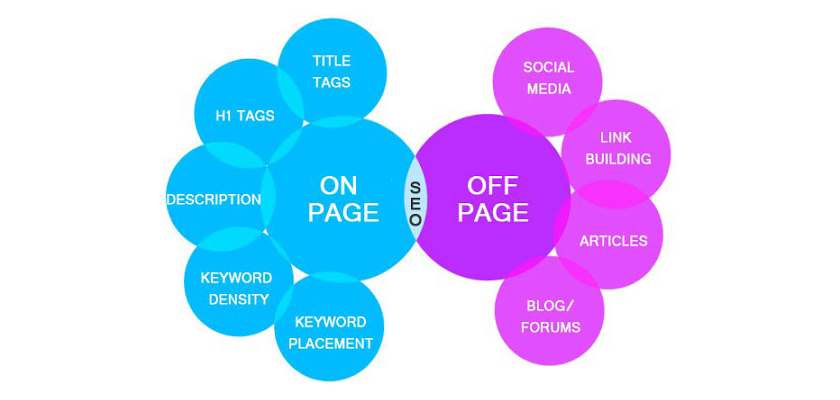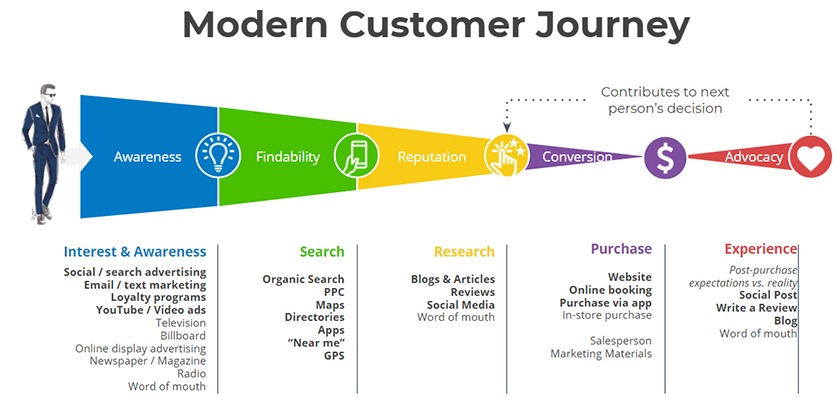The businesses of today cannot make it without establishing a robust online presence. After all, a significant chunk of the world population is online! To be precise, according to Statista, this amounts to approximately 4.72 billion users!
In 2021 so far alone, Google has received over 360 billion search queries, as reported by Internet Live Stats. So, how do you make sure that your website pops up for relevant search results? The short answer is through search engine optimization.
However, SEO is merely an umbrella term that includes off-page and on-page SEO.

To attain a high search engine ranking, you need to implement both. But, before you do so, it is imperative for you to understand the difference between the two.
An Overview of On-Page SEO
On-page SEO refers to all optimization strategies that are implemented on your website specifically in hopes of ranking it better. This ranges from the website structure all the way to the content you place on your site.
The objective of on-page SEO is to improve the quality and relevancy of your content so that both readers and search engine bots find it useful. Here are some of the top on-page SEO tactics that are employed by experts:
i) Website Structure: The technical aspects of a website are optimized to improve page speed and site navigation.
ii) Title Tags: Optimizing title tags involves using titles that will help users know what a given webpage is about.
iii) Meta descriptions: These are the short descriptions that appear below the title tag on the search results. Search engines and readers to get a gist of the content displayed on the webpage.
iv) Keyword Optimization: High-performing and relevant keywords are cohesively added to content within the website. Heading Tags are further used to categorize the content.
URL and XML sitemap: Search engine-friendly URLs are created, and a sitemap is developed to act as a roadmap for the website.
An Overview of Off-Page SEO
As the name suggests, off page SEO includes all optimization strategies conducted off the website in an attempt to boost the ranking of the site. Here, the motive is to improve the trustworthiness of a website by improving backlinks and brand mentions on other platforms.
There are certain elements of off-page SEO that are beyond the control of a brand. For instance, let’s say you run a restaurant. You cannot control your YELP reviews that affect your credibility.
However, you can manage reviews by responding well to the negative ones and appreciating the positive ones, thereby using the opportunity as a way to reflect your customer support services. This image building comes under off-page SEO.
Tactics of off-page SEO include:
i) Link Building: Here, you use customer outreach and influencer onboarding to improve the number and quality of backlinks to your website.
ii) Social sharing: While it may not directly impact ranking, social sharing boosts online visibility and brand awareness which can help improve organic traffic.
iii) Guest posting: By posting on a different authoritative website, you increase both your backlinks as well as leverage the follower count of other websites.
iv) Brand Mentions: Tools like Mention are used to identify unlinked brand mentions, and emails are sent to the concerned individuals to include the link of your brand in their content.
On-Page SEO vs. Off-Page SEO: The Battle
The key difference between on-page and off-page SEO lies within the tactics employed. However, to compare their effectiveness, it is important to understand the unique underlying benefits the two provide.
On-Page SEO Helps in Building Brand Authenticity
At the end of the day, it all comes down to the experience your users have with your brand. Regardless of what medium they are coming from, if your website fails to impress them, you have lost the battle. For starters, according to Hobo Web, a page load delay of 3 seconds increases the bounce rate by 32 percent!
Similarly, if users don’t find your content relevant to their need, they will not complete the desired action. On-page SEO helps in all of these aspects. By improving your website’s performance and content relevancy, it ensures that visitors don’t bounce.
Off-Page SEO Helps Bring People to the Brand
Every business needs a push. And off page SEO is the online push that helps boost brand awareness and recall.
The consumer buying journey is immensely complex. Just because they find a brand online doesn’t mean they will purchase from it. Instead, they add it to their pool and further narrow down choices based on their research.

Off-page SEO helps in tilting the results of the research in your favor. How so? Well, the more social media mentions you have and the more people that link back to your site, the more trustworthy it may seem.
Bridging the Difference
Yes, the two types of search engine optimization are starkly different. However, this doesn’t mean that one is better than the other. Nor does it mean that you need to prioritize either one. The right approach is to balance both.
Instead, you can say that on page SEO is the foundation upon which off page SEO can thrive. Only when your website is optimized and relevant is it worth investing in improving the off-page buzz of your brand.
For an impeccable online presence and a high rank of your website, you need to employ both types of strategies. Build a flawless website, optimize its content and speed and move on to generating backlinks and social media mentions of your brand. At the same time, keep your website well-maintained via updated content.


